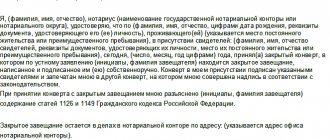Unified base in the Russian Federation
Citizens are very often interested in the question of how to check the existence of a will. We will try to answer in detail.
Since June 1, 2014, the project “ Unified Database of Wills in the Russian Federation ” has been operating in our country. This is an information database that is available in electronic form for internal use by the notary community.
The Unified Data Register contains all notarized wills. The legislative implementation of this system eliminates document falsification and significantly reduces the time for searching for valid wills drawn up later than July 1, 2014, since each of them has its own number.
Interesting questions
There are those who are concerned about how the notary finds out about the death of the testator. In fact, the lawyer receives such information from the heirs of the deceased themselves. The notary does not receive any information about the death of a person from authorities such as the registry office or law enforcement agencies.
When a potential heir learns of the death of one of the family members, he himself must contact a notary to search for a will. Thus, you can get an answer to the question: “how to find out whether there was a will and how to look for it?”
How to find out about a will after the death of a relative?
In Russia it is very difficult to find out whether a will has been drawn up . Firstly, because there is no mandatory registration of wills in a single database. Secondly, because the people present when drawing up a document on the inheritance of property must keep secret both the subject of the inheritance and the persons included in the will.
If the testator himself did not inform where the document is stored, then the heir will have to conduct the search independently .
Attention!!! It is prohibited by law to search for a will during the life of the testator!!!
Let's take a closer look at where you can find a will.
Finding a house from the testator
The will is drawn up in 2 copies and one of them remains with the testator . Therefore, to begin with, it is worth conducting a search for the will of the deceased’s house . Particular attention should be paid to the places where the deceased kept documents.
If the testator lived not alone, but with close people, then they most likely know where the deceased kept this valuable document, but often these are the closest relatives who may not come to give the will, because they themselves can lay claim to the inherited property.
Contacting a notary
When unsuccessful searches have been carried out at the address of the last location, you can proceed further. The second step of the search is to contact a notary located in the territory of the testator’s last place of residence.
In this case you need to present:
- personal passport of the heir;
- death certificate of the testator;
- documents confirming the relationship with the testator.
Request to the notary chamber
Going through all the offices one by one can take a lot of effort and time, and the heir has limited time.
Important!!! If the nearest notary did not have the document, then it could be certified by another, since the law of the Russian Federation allows you to contact absolutely any notary.
The next step for searching is a request in writing to the regional (territorial) notary chamber . This organization stores information about all transactions made in the subordinate region. Along with the written request you will need to present:
- personal passport of the heir;
- death certificate of the testator;
- documents confirming the relationship with the testator.
In a situation where a citizen looking for a will in his name is far from the required notary office, the request is sent by mail and copies of the above documents are attached to it.
How to find out about a will.
Why do you need to draw up a will for an apartment?
Any living space is quite expensive, so in order to avoid disputes between the owner’s heirs about the future fate of the property, it is wise to plan in advance who will own it after the owner’s death. However, you can only bequeath your own apartment (purchased independently, privatized, received under a gift agreement, exchange, etc.).
Therefore, before making a will, you need to make sure that all real estate documents are in order. If not, you should complete the paperwork.
When writing a will, you should immediately decide on the number of heirs, decide whether you will set additional conditions for them to enter into their rights, and write down the share of each as a percentage. Remember that a testamentary disposition is intended to eliminate disputes between people close to you over the division of property.
Drawing up a will does not cancel your right to use the apartment: you can live in it alone or with relatives, make repairs, or rent it out. If necessary, the order may be revised or canceled.
What to do if you couldn't find the document?
It happens that a will is not found after completing all the steps described above, but it is still there. Such a will could be drawn up in conditions where it is impossible to contact a notary. Thus, in some situations, the written order of the testator can be certified by the following persons:
- the head of the colony, when the testator is in prison;
- the head physician of the hospital where the testator underwent long-term treatment;
- commander of a ship when on a long voyage;
- commander of a military unit during combat operations;
- 2 witnesses if it is impossible to certify the document with the above-mentioned persons (the testator is in an emergency situation).
We wrote about who, besides a notary, can certify a will here, and here you will learn about how the document is drawn up with a notary and without him.
Methods of inheritance
Inheritance can occur in two ways – by law/will. In most cases, citizens inherit property within the framework of the law.
The principle of priority applies here. The priority right belongs to the parents, children, and spouse of the testator.
Heirs of the second stage according to Art. 1143 of the Civil Code of the Russian Federation are the brothers and sisters of the deceased subject. If the testator had dependents, then they are included in the applicants of the corresponding queue.
If there is an order, the situation changes radically. The composition and shares of the heirs are determined by the will.
If the testator has written off all the property, then the legal heirs are left with nothing. In cases where only part of the property appears in the disposition, the remainder of the assets is inherited within the framework of the law.
Mandatory heirs according to Art. 1149 of the Civil Code of the Russian Federation provides for a portion of the property regardless of the last will of the testator. If they are specified in the order, then the rule on the mandatory part does not apply. The only condition is that their share should not be less than ½ of the share that would be due to them upon inheritance by law.
Important! Regardless of the method of inheritance, applicants must declare acceptance of the inheritance within six months.
List of papers required for registration of inheritance
To register the inheritance procedure, the heir must submit a corresponding application to the notary located in the territory of the inheritance object. The following must be submitted along with the application:
- personal Russian passport of the heir;
- death certificate of the testator;
- documents on the relationship with the testator;
- certificate of the last place of registration of the testator;
- documents proving the property rights of the testator;
- copies of bank accounts;
- certificates confirming the absence of debts (from the tax and housing and communal services services).
Important! Based on the application, the notary opens an inheritance case. As a result of which the heir or heirs can enter into property rights to the inheritance.
Documents for entering into inheritance.
Legislation
Expert opinion
Novikov Konstantin Yakovlevich
Lawyer with 8 years of experience. Specialization: family law. Extensive experience in protecting legal interests. Evgeniy
The drawing up of a will, its storage and opening is carried out on the basis of the Civil Code of the Russian Federation. The fifth section of this legal act is devoted to the topic of inheritance.
It covers the following topics:
- general provisions on the concept of “inheritance”;
- inheritance by will;
- obtaining property under the law;
- how an inheritance is acquired;
- How can you obtain certain types of property?
Each article reveals in detail all the nuances that a testator or heir may encounter.
Financial expenses
Since 2005, persons who received an inheritance are not required to pay tax on inherited property. But you will still have to incur expenses - pay a state fee for registration by a notary of all documents allowing you to enter into inheritance rights. According to the legislation of the Russian Federation, the amount of payment depends on:
- The presence or absence of a relationship between the heir and the testator.
- The value of inherited property.
So for immediate relatives, the state duty will be 0.3% of the value of the inheritance, up to a maximum of 100 thousand rubles. Distant relatives or unrelated persons will pay 0.6% to the state, maximum 1 million rubles.
Attention! A notary does not have the right to independently evaluate his services. The amount of the state duty is established only by law.
Property can be valued at cadastral, inventory or market value - at the discretion of the heir.
Our specialists have prepared for you other materials on the topic of wills. Read about:
- what types of this document are there;
- how to challenge;
- how much does it cost to register with a notary?
- what is the secrecy of a will;
- how to change or cancel;
- Which is better - a will or a deed of gift?
Video about execution and storage of orders
- Due to frequent changes in legislation, information sometimes becomes outdated faster than we can update it on the website.
- All cases are very individual and depend on many factors. Basic information does not guarantee a solution to your specific problems.
That's why FREE expert consultants work for you around the clock!
- via the form (below), or via online chat
- Call the hotline:
The purpose of making a will is to transfer the estate to a specific person or group of people. The property that will remain after the death of the author of the document is transferred. Successors should know where the will is kept in order to be able to exercise their rights.










